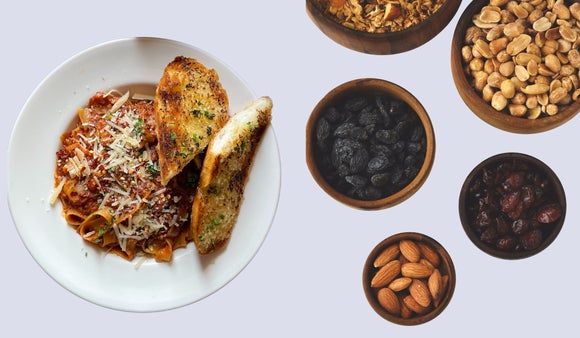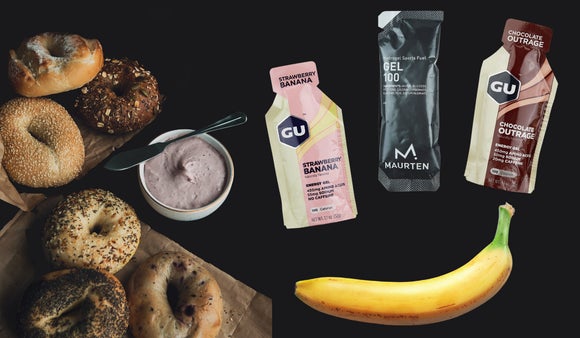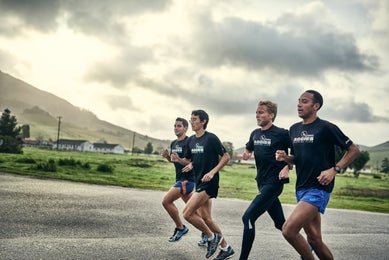The ABCs of Carb Loading
If you have ever run a half/full marathon or ultramarathon, you most likely have heard the term "carb loading." Carb-loading is a common technique among athletes and endurance runners to help boost energy levels and performance on race day.
Updated: 8th February 2024

What is Carb Loading?
Before we dive into how to carb-load, let us first define what carb-loading is. Carb loading is an approach to nutrition used by athletes to maximise their glycogen stores for endurance events. This process involves gradually increasing carbohydrate intake during the days leading up to a racing event or competition. Carbohydrates, when consumed, are broken down into simple sugars, such as glucose, which then is absorbed into the bloodstream. If there is more glucose than the body needs for energy, the excess is stored in the liver and muscles (as glycogen) or converted to fat and kept in the body’s fat cells. It is critical to time the carb loading appropriately and monitor intake to ensure that you are not eating too much or too little, as this can be counterproductive and lead to fatigue or a drop in performance. By consuming an increased amount of carbohydrates in the days leading up to an event, athletes can store more energy-rich glycogen in their muscles and liver, helping them to maintain a higher intensity for a longer duration.
How to Carb Load
Carb loading is a vital part of pre-race nutrition for runners, helping to maximise glycogen stores and improve performance. To carb load, you should gradually increase your carbohydrate intake to about 70% of your total caloric input and decrease your fat and protein consumption in the days leading up to the race. General guidelines are to begin carb loading 3-4 days before the event. The specific number of carbohydrates a person will need can vary from each individual (and from study to study). The suggested consumption of carbs is approximately 10 to 12 grams per kilogram (4.5 to 5.5 grams per pound) of body weight for optimal results. The chart below displays some examples of what that looks like.
| Bodyweight (kg) | Carbs (g) | Total Calories from Carbs |
| 54 kg | 540-660 | 2,160-2,640 |
| 63 kg | 630-770 | 2,520-3,080 |
| 72 kg | 720-880 | 2,880-3,520 |
| 81 kg | 810-990 | 3,240-3,960 |
| 90 kg | 900-1100 | 3,600-4,400 |
Three ways to maximise your carb-loading journey:
1. Make a plan- This is a hefty amount of carbs and will likely take some pre-planning. If you have access to a dietitian, working with them could be a beneficial tool.
2. Don't forget to hydrate- It's vital to ensure you are staying hydrated, as this will help maximise the benefits of carb-loading.
3. Water retention is normal- A common occurrence when increasing your carb intake is retaining water. During this period, you might experience some weight gain because the body is holding on to extra glycogen and water to fuel the muscles for an upcoming workout or race.
The Carb Conundrum
Carbohydrates are the primary fuel source for marathon runners. The amount of carbohydrates stored in the body as glycogen will determine how far runners can go. At the start of a marathon, the body is burning off a mixture of fat and carbohydrates; the harder you run, the more carbohydrates you consume. However, as the race goes on, the glycogen stores become depleted, and the body starts to burn more fat, which is less efficient and will cause the runner to slow down and hit the infamous "Wall."
Carb-loading is a technique applied by marathoners in the days leading up to a race to increase their glycogen stores by eating a high-carbohydrate diet, helping them push past the wall to the finish line. It is important to be mindful of what types of carbohydrates are being consumed, as some "fattening" carbohydrates are not beneficial.
Different Carbohydrates Provide Different Benefits

Different types of carbohydrates provide differing benefits, so it is helpful to understand the differences and choose the type of carbs that are best for your needs. Complex carbohydrates provide longer-lasting energy and can help to reduce fatigue, while simple carbohydrates provide a quick burst of energy. The type of carbohydrate you choose should depend on the intensity and duration of your activity. Complex carbs are the food source you'll want to eat while carb-loading since you won't need instantaneous energy, and they provide more fibre and nutrients. Conversely, simple carbohydrates are great to consume while racing for a rapid burst of energy. Depending on the duration of your run, a mixture of complex and simple carbohydrates can be beneficial during a race, especially when getting into ultra-marathon distances.
Some examples of complex and simple carbohydrates include:
| Complex Carbohydrates |
Simple Carbohydrates |
|
1. Grains, such as wheat, oats, barley, and rye 2. Legumes, such as beans, peas, and lentils 3. Starchy vegetables, such as potatoes, corn, and squash 4. Nuts and seeds 5. Dairy products, such as milk and yogurt 6. Fruits, such as apples, bananas, and oranges. |
1. White rice 2. White bread/ pasta 3. Pretzels 4. Energy Gels 5. Drink Mixes, Hydration & Energy Drinks 6. Fruit juices/ Dried fruits |
Race Day Rations

Race day rations are essential to a marathon or ultra race preparations. Correctly carb-loading a few days before the race will help to ensure that your muscles have enough glycogen stores to last throughout the competition. On the morning of the event, you should have a light, high-carbohydrate breakfast, such as a bagel with jam and a banana, to help restore your liver's glycogen level and maintain your blood glucose level. During the race, you can continue to stave off glycogen depletion with smart nutrition, such as energy gels or energy drinks. However, if you have not tried these food sources before, it is best to avoid unfamiliar nutrition as they may upset your system. Ultimately, the key to success on race day is to have a well-thought-out plan and stick to it.

